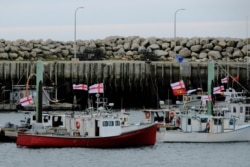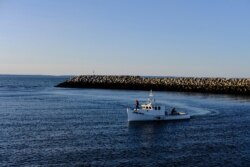Royal Canadian Mounted Police are helping to maintain an uneasy peace between Indigenous and non-Indigenous fisherman in the Canadian province of Nova Scotia after a dispute over centuries-old treaty rights spilled over into violence and vandalism.
The trouble began after Mi’kmaq communities from the Sipekne'katik First Nation began fishing for lobster in the Bay of Fundy during a period that is out of season for other lobstermen.
The Mi’kmaq argue the fishing is permitted by treaties with European colonizers from the 1700s and by a 1999 decision of the Canadian Supreme Court. However the action angered the region’s non-Indigenous fishermen, who fear the Mi’kmaq are seeking to establish an off-season commercial fishery that will endanger lobster stocks they all rely on for a livelihood.
Two people have been arrested after incidents in which the Mi’kmaq charged that non-Indigenous fishermen had cut their lobster traps and fired flares at them when they tried to retrieve the traps.
Police also report investigating shots fired and threats, and Mi’kmaq communities have been sharing on social media threatening or racist social media posts from nearby non-Indigenous communities. Activists have reported that some supply stores have stopped selling to Indigenous fishermen.
“When you see that in our waters, our question is what is Canada going to do about that?” asks Susan Levi-Peters. A former chief of the Elsipogtog First Nation, Levi-Peters ran for office in provincial politics in the neighboring province of New Brunswick.
“You see these huge vessels going after small little boats. I’m just hoping there’s going to be a peaceful resolution before there’s any casualties, anything like that, because it’s going to get dangerous,” Levi-Peters said.
The recent events recall the grim events of Burnt Church, New Brunswick, now 20 years ago, of race riots between non-Indigenous and Indigenous fishermen that included arson and the use of firearms.
Jennifer Clarke, the public information officer for the RCMP in Nova Scotia, said a local detachment “has responded to several calls, including uttering threats, mischief, and related complaints. Each of these complaints is being investigated.”
She added that an RCMP liaison team “is deployed and engaged impartially with all community partners. We will remain in Saulnierville to ensure public and police safety, and to keep the peace.”
The confrontation is also causing headaches for the administration of Prime Minister Justin Trudeau, which already had a strained relationship with Indigenous communities after a series of incidents that led to the arrests of Indigenous environmental activists.
Both sides in the Nova Scotia dispute have accused the federal government of inaction, with non-Indigenous fishermen demanding that it enforce its laws on fishing out of season, and with Indigenous communities accusing it of indifference to targeted attacks against them.
Members of the Mi’kmaq community say that the fishing dispute has deep roots in the often unsavory history of Canada’s treatment of its Indigenous peoples.
“The government by design of course has relied on ignorance on the part of Canadians not to understand the peace treaties at hand,” says Mi’kmaq musician Hubert Francis, a highly acclaimed recording artist.
“Treaties basically affirmed the rights of the Mi’kmaq, and it took hundreds of years for the Supreme Court to also affirm and that created the current situation. Regardless, the Mi’kmaq have the right to harvest commercially.”
Colin Sproul, president of the Bay of Fundy Inshore Fishermen’s Association and Southwest Lobster Science Society, told VOA the non-Indigenous fishermen’s complaint “is not with Indigenous fishers who have a treaty right to fish. We respect and support indigenous fishery access and have strived for coexistence and dialog for decades.
"Our issue is with [Fisheries Minister Bernadette] Jordan and the Trudeau government, who refuse to enforce existing law or find a resolution for Indigenous people’s legitimate rights. Minister Jordan and the prime minister have failed commercial and indigenous fishers, terribly."
Sproul added that "the only way out of this impasse is with dialogue. Canadian fishers want to sit down with all participants in the industry, along with government and find an equitable way forward."
The Indigenous communities complain that the non-Indigenous fishermen’s concerns are overblown, and that the 350 lobster traps set by the Mi’kmaq are insignificant compared to many thousands of traps laid by commercial lobster fishing.
They also point to the so-called Marshall Decision, issued by the nation’s supreme court in 1999, which interpreted treaties established in the 1700s as protecting the groups’ right to hunt, fish and gather in pursuit of a "moderate livelihood."
“For my people, it’s been an ongoing battle just to try to make a moderate livelihood. It’s tough because we’re labeled lazy or drunk, but when we want to work, we end up being criminalized or harassed,” says Susan Levi-Peters.
“To think that most of our people are jobless or homeless or living below poverty level is very hard to understand. But now with social media and with people telling our story more it’s changing. People are starting to see that hey, they want to work but they’re being harassed, they’re being denied their rights.”



